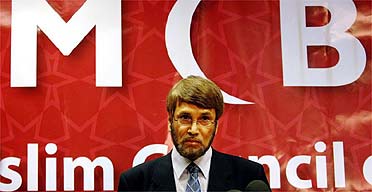Britain's most influential Muslim umbrella group today signalled a major shift in policy as it urged its communities to play a key and potentially decisive role in the fight against terrorism.
Declaring that "condemnation is not enough", leaders of the Muslim Council of Britain, which has 400 affiliate organisations, voiced its most robust message yet and appealed to all Muslims to work hand in hand with the police.
The message carries dangers for the MCB, which has been criticised by radical activists for being too close to the government and the establishment.
But today Muhammad Abdul Bari, the MCB secretary general, said the current crisis meant that issues of conflict between the government, the police and Muslim communities - who have clashed in the past over anti-terrorist incidents and foreign policy - needed to be put to one side.
"When the house is on fire, the concern must be not to blame each other but to put the fire out. Our country is under threat-level critical.
"Those who seek to deliberately kill or maim innocent people are the enemies of us all. There is no cause whatsoever that could possibly justify such barbarity."
He said the police and security services "deserve the fullest support and cooperation from each and every sector of our society, including all Muslims."
The MCB has called a meeting in London on Saturday of key imams and activists from all over the country to discuss what Muslim communities can do to confront the threat and to discuss whether more should have been done in the past.
"We hope to discuss how we can work better with other partners, including the police, to try to undermine and defeat the terrorists who seek to attack us," said Dr Bari.
"It is our Islamic duty not only to utterly and totally condemn such evil actions but to provide all the necessary support to prevent such atrocities from taking place."
Inayat Bunglawala, the MCB's assistant general secretary, said anyone with information should not feel conflicted.
"There must be no hesitation in coming forward," he said. "Clearly we face a threat from extremists who happen to be Muslim."
Mr Bunglawala said the group was confident that affiliates would back the new stance.
"The overwhelming majority of Muslims will understand the predicament our nation is in. The risk is not that we will lose affiliates. We are more likely to gain them."
Though shocked by the failed terrorist attacks on London and Glasgow, there are signs that both the MCB and the government are seeking to seize the moment.
Relations between Muslim leaders and the Blair government deteriorated amid concerns that the prime minister, the former home secretary John Reid and the former communities secretary Ruth Kelly gave succour to those who sought to blame the wider Muslim communities for terrorism.
But Dr Bari was quick to praise Gordon Brown and Jacqui Smith, the new home secretary, for the "calm and reassuring tone" of their comments since the weekend's attacks.
"They made clear that it was unacceptable to hold any one faith group responsible for the actions of a few," he said.
He also praised Alex Salmond, Scotland's first minister, who provided high-profile reassurance to Muslims north of the border.
This approach, though criticised by some newspapers, has allowed the MCB to call for a period of soul searching without facing new accusations of pandering to hostile politicians.
One official privately described the events and the political reaction to them as a "line in the sand moment".
The unfolding events, though horrific, may well strengthen the hand of moderate Muslim opinion.
One source said: "There is little room for manoeuvre for those who have previously been in denial or have clung to conspiracy theories. People have been able to see for themselves what happened. That could be important."
Anti-terrorist chiefs have been quick to stress the need for communities to provide them with the intelligence they need to find and monitor suspects.
But close liaison between Muslim leaders and the authorities is also seen as crucial in the battle to stop a whole new generation of young people becoming radicalised.
Daud Abdullah, the MCB deputy secretary general said: "We accept there is a degree of extremism and radicalisation taking place in the community. This is a long-term problem."
